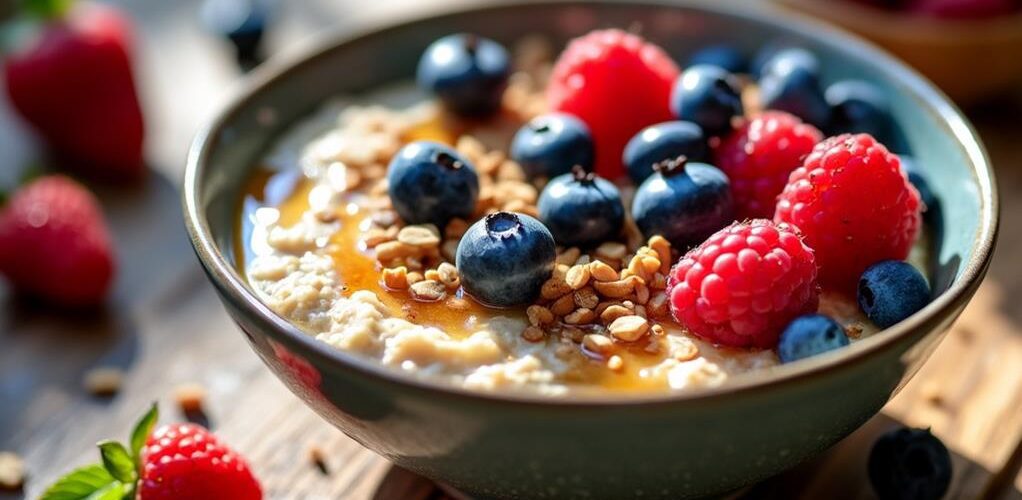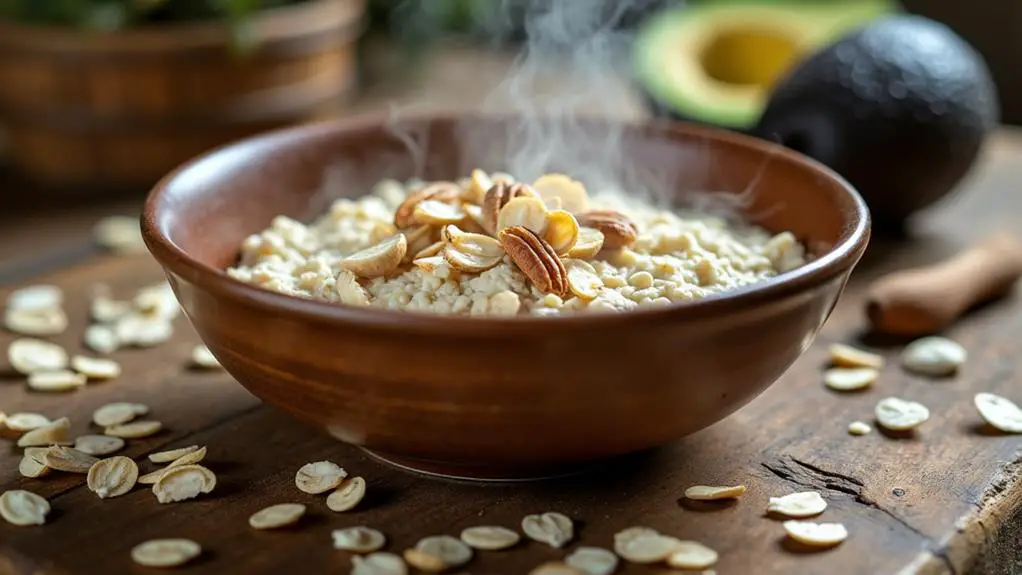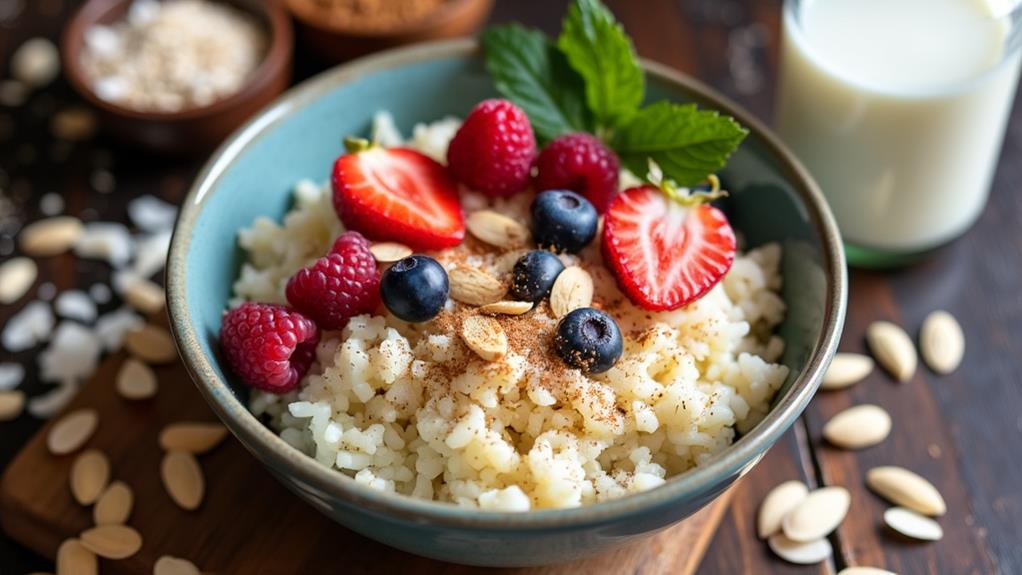
Oatmeal is generally unsuitable for a ketogenic diet due to its high carbohydrate content, which can disrupt ketosis. A single cup of cooked oatmeal contains approximately 27 grams of carbohydrates, greatly exceeding the typical daily carb allowance of 20-50 grams essential for maintaining ketosis. Oatmeal's high glycemic index can lead to rapid blood sugar spikes, undermining insulin sensitivity and appetite control—key objectives of the keto diet. While oatmeal does offer dietary fiber benefits, these are offset by its carbohydrate load. For an effective keto-friendly breakfast, flaxseed or chia seed options may better align with dietary goals. Discover more alternatives and strategies ahead.
Key Takeaways
- Oatmeal's high carbohydrate content exceeds the daily carb limit for achieving ketosis on a keto diet.
- The high glycemic index of oatmeal causes rapid blood sugar spikes, disrupting ketosis.
- Consuming oatmeal can counteract efforts to improve insulin sensitivity by increasing glucose levels.
- Oatmeal's carbohydrate content outweighs the benefits of its fiber for maintaining ketosis.
- Oatmeal disrupts keto goals by converting carbohydrates swiftly into glucose, increasing hunger and cravings.
Understanding the Keto Diet
How does one alter their body's primary energy source from carbohydrates to fat? The ketogenic diet provides a structured approach to this metabolic shift by considerably reducing carbohydrate intake and increasing fat consumption.
Typically, a keto diet comprises 55-60% fat, 30-35% protein, and a mere 5-10% carbohydrates, limiting daily carb intake to 20-50 grams. This macronutrient distribution promotes the state of ketosis, where the body primarily burns fat for energy, offering keto benefits such as enhanced weight loss and appetite suppression.
Additionally, ketosis lowers ghrelin levels, further aiding in appetite control and reduced cravings, making it easier to maintain a caloric deficit. The keto diet emphasizes foods like meats, fish, eggs, dairy, and non-starchy vegetables, while strictly avoiding high-carb foods such as grains and sugars.
This dietary pattern not only facilitates a metabolic shift but may also contribute to improved blood sugar control and has shown potential therapeutic effects for epilepsy.
However, diet sustainability remains a critical consideration, as adherence to such a restrictive regimen can be challenging for some individuals. The long-term effects and feasibility of maintaining ketosis warrant careful evaluation, balancing the immediate health benefits against the practicality of sustaining such a diet in everyday life.
Carb Limits on Keto
Shifting focus from understanding the ketogenic diet's metabolic framework, a vital component to maintaining ketosis involves strict adherence to carbohydrate limits. The ketogenic diet typically restricts carbohydrate intake to 20-50 grams per day, necessitating rigorous carb counting.
This precise carb management guarantees the metabolic shift toward burning fat for fuel, rather than carbohydrates, is sustained. For individuals adhering to a 2,000-calorie keto regimen, this translates to macronutrient ratios of approximately 55-60% fat, 30-35% protein, and a mere 5-10% carbohydrates, underscoring the significant nature of dietary adjustments to accommodate these restrictions.
Achieving and maintaining ketosis can take several days and is vital for maximizing the health benefits associated with the diet. Monitoring carbohydrate intake is essential to prevent the body from exiting ketosis, a state imperative for the diet's efficacy in weight management and metabolic health.
Foods with high carbohydrate content, such as oatmeal, pose a significant challenge due to their potential to exceed daily carb limits and their high glycemic index, which can induce blood sugar spikes. Such fluctuations may disrupt the stable glucose levels desired on a ketogenic diet.
Consequently, careful carb counting and strategic dietary adjustments are indispensable for individuals committed to the ketogenic lifestyle, guaranteeing the diet's objectives are met effectively.
Oatmeal's Carb Content
Oatmeal, a staple in many diets, presents a considerable challenge for those adhering to a ketogenic lifestyle due to its high carbohydrate content. A typical serving of cooked oatmeal, about one cup, contains approximately 27 grams of carbohydrates. This amount can greatly exceed the daily carbohydrate limits of a ketogenic diet, often restricted to 20-50 grams per day to maintain ketosis.
For instance, low-carb vegetables and dairy are favored in keto diets, unlike high-carb grains like oatmeal. Regarding oatmeal nutrition, it is evident that the carbohydrate density of oatmeal overshadows its dietary fiber benefits for individuals on a keto regimen.
Furthermore, regular oatmeal has around 47 grams of net carbohydrates per cup, rendering it largely incompatible with strict keto adherence. Even oat milk, a popular derivative, contributes approximately 17 grams of net carbohydrates per cup, complicating the management of carbohydrate intake.
These figures underscore the importance to seek breakfast alternatives that align with ketogenic requirements. It is essential for keto practitioners to explore options with lower carbohydrate profiles to meet their nutritional needs without compromising ketosis.
Consequently, while oatmeal is nutritionally rich in various contexts, its heightened carbohydrate content poses a considerable barrier for those committed to a ketogenic lifestyle.
Oatmeal's Glycemic Impact
The glycemic impact of oatmeal is a critical consideration for individuals adhering to a ketogenic diet. Oatmeal exhibits a high glycemic index, which translates to a rapid glycemic response characterized by significant spikes in blood sugar levels. This physiological response is antithetical to the principles of a ketogenic diet, which prioritizes maintaining low blood glucose to sustain ketosis.
For those managing Type 2 diabetes, it is essential to improve insulin sensitivity, and oatmeal's high carbohydrate content can counteract these efforts. A typical serving of oatmeal contains approximately 27 grams of carbohydrates, primarily as starches that swiftly convert to glucose. This carbohydrate content can easily surpass the daily carbohydrate limit of 20-50 grams, a threshold designed to minimize glycemic fluctuations and support a fat-burning metabolic state.
Moreover, the rapid conversion of oatmeal's carbohydrates into glucose can disrupt ketosis, leading to an enhanced glycemic response. This alteration in blood sugar not only undermines the metabolic benefits of ketosis but may also amplify hunger and cravings. Such effects are counterproductive to the appetite-suppressing advantages associated with ketogenic diets.
Despite oatmeal's high fiber content, which is generally favorable for digestive health, it does not adequately mitigate its overall carbohydrate load. Consequently, oatmeal's glycemic impact renders it unsuitable for those strictly adhering to a ketogenic dietary regimen.
Fiber and Keto Compatibility
While fiber is essential for digestive health and can enhance satiety, its role in a ketogenic diet must be evaluated within the context of carbohydrate management.
The ketogenic diet emphasizes low-carbohydrate intake to maintain ketosis, which is vital for improved insulin sensitivity and blood sugar stability.
Oatmeal, although rich in soluble fiber like beta-glucans, presents a challenge due to its high carbohydrate content, which can impede ketosis despite fiber's ability to offset total carb counts.
For those adhering to a strict keto regimen, selecting alternative sources of fiber with lower net carbohydrates is vital to maintain metabolic goals.
Fiber's Role in Ketosis
Fiber is an integral component of the ketogenic diet, playing a pivotal role in maintaining digestive health and enhancing satiety without considerably increasing net carbohydrate intake.
Fiber sources such as chia seeds and flaxseeds are particularly advantageous due to their high fiber content and low net carbohydrates, supporting the gut microbiota and promoting regular bowel movements. These attributes make them compatible with the low-carbohydrate framework of a keto diet, distinguishing them from high-carb foods like oatmeal.
Despite oatmeal's beneficial soluble fiber content, particularly beta-glucan, its substantial carbohydrate load (approximately 27 grams per cup) poses a challenge for those adhering to a strict ketogenic regimen. The consumption of high-carb foods like oatmeal can disrupt ketosis, the metabolic state central to a ketogenic diet, by exceeding daily carbohydrate limits.
This disruption underscores the significance of selecting fiber sources that align with keto principles.
Chia seeds and flaxseeds offer a balanced solution, providing essential fiber for digestive health without jeopardizing ketosis. Consequently, while fiber is essential, the selection of appropriate fiber sources that guarantee digestive well-being and compliance with dietary carbohydrate restrictions is vital for maintaining ketosis and optimizing the benefits of a ketogenic lifestyle.
Managing Carbs With Fiber
Balancing carbohydrates with fiber intake is a critical consideration for individuals adhering to a ketogenic diet. Fiber benefits the digestive system and enhances satiety, making it a crucial component of dietary strategies focused on maintaining ketosis.
Despite its benefits, fiber must be carefully managed to prevent excessive carbohydrate consumption, which could disrupt ketosis. Fiber sources such as vegetables, nuts, and seeds are advantageous in this situation as they can help reduce net carb counts. This approach enables a broader range of food choices while adhering to the ketogenic limits of 20-50 grams of carbohydrates per day.
The recommended daily fiber intake is approximately 25 grams for women and 38 grams for men. However, these recommendations must be adjusted for keto dieters to maintain compatibility with low-carb goals.
Foods like flaxseeds and chia seeds, which are high in fiber but low in net carbs, serve as ideal fiber sources that align with ketogenic principles. Conversely, despite oatmeal's high fiber content, its carbohydrate level (around 27 grams per cup) makes it incompatible with strict ketogenic regimens.
Therefore, selecting appropriate fiber sources is essential for keto practitioners seeking to optimize digestion and satiety without compromising ketosis.
Oat Milk Considerations
Steering through the intricate landscape of the ketogenic diet necessitates a thoughtful evaluation of oat milk's nutritional profile. With approximately 17 grams of net carbohydrates per cup, oat milk presents challenges for those adhering to a strict keto regimen, which customarily restricts carbohydrate intake to 20-50 grams per day.
It's essential to note that excess carbohydrates can disrupt ketosis, similar to how excess protein can lead to increased insulin levels and hinder fat loss. The glycemic index of oat milk further complicates its compatibility with keto, as it may induce spikes in blood glucose, countering the diet's aim of achieving stable blood sugar and insulin levels.
Despite its lower carbohydrate content compared to traditional oatmeal, oat milk is not classified as keto-friendly. However, individuals might consider incorporating oat milk in small quantities, provided their overall carbohydrate intake is meticulously managed.
This nuanced approach can accommodate oat milk recipes for those who are not on the most stringent ketogenic plans. For those seeking oat milk alternatives, almond milk and coconut milk emerge as preferable options due to their lower carbohydrate content.
These alternatives allow for greater flexibility in adhering to carbohydrate limits while also offering versatility in keto-friendly recipes. Consequently, while oat milk poses certain challenges, careful planning and alternative choices can facilitate its occasional inclusion in a ketogenic diet.
Resistant Starch in Oats

While the carbohydrate profile of oat milk poses challenges for a ketogenic diet, oats themselves introduce another complexity through their resistant starch content. Resistant starch acts as a fermentable fiber, which resists digestion in the small intestine and subsequently undergoes fermentation in the colon, promoting gut health by nourishing beneficial gut bacteria. This process can lead to improved gut microbiota diversity, potentially enhancing overall digestive health.
Notably, cooling cooked oats prior to consumption increases their resistant starch content, thereby amplifying their health benefits. However, this adaptation may inadvertently affect carbohydrate absorption rates, complicating their suitability for a keto diet. Despite the advantageous properties of resistant starch regarding promoting satiety and potentially aiding in weight management, the substantial net carbohydrate content of oats remains problematic for maintaining ketosis, a fundamental aspect of the ketogenic lifestyle.
Moreover, the presence of resistant starch in oats may lead to underestimations of their carbohydrate impact, potentially disrupting blood sugar levels and ketosis. Although resistant starch offers notable health benefits, these are often outweighed by the high carbohydrate content in oats, rendering them incompatible with a strict ketogenic diet.
The complexity of resistant starch underscores the nuanced challenge of incorporating oats into keto regimens.
Total vs. Net Carbs
How does one effectively navigate the carbohydrate landscape in pursuit of ketosis? The distinction between total carbs and net carbs becomes essential in this scenario. Total carbohydrates, as indicated on nutritional labels, encompass all forms of carbohydrates present in a food item, including sugars, starches, and fibers.
However, for ketogenic diet adherents, the focus shifts to net carbs, calculated by subtracting dietary fiber and half of sugar alcohols from the total carbs. This distinction is important, as net carbs are the primary consideration when adhering to the strict carbohydrate limits necessary to maintain ketosis.
Keto dieters tend to lose more weight than those on low-fat diets due to their meticulous management of net carbs and higher fat intake, which promotes satiety. Oatmeal serves as a pertinent example. A typical serving contains approximately 27 grams of total carbohydrates.
Despite its considerable fiber content, which could potentially reduce the net carb value, oatmeal still poses a challenge for those on a ketogenic diet. Foods high in fiber, like oats, can greatly contribute to total carb intake, potentially surpassing the recommended 20-50 grams of net carbohydrates per day.
Therefore, understanding and effectively calculating net carbs is essential for individuals seeking to manage their carbohydrate intake meticulously, thereby achieving and sustaining the desired metabolic state of ketosis.
Keto-Friendly Oatmeal Alternatives

Exploring keto-friendly oatmeal alternatives reveals a variety of low-carb options that can satisfy cravings for a warm, hearty breakfast without disrupting ketosis. These alternatives are designed to align with the macronutrient requirements of a ketogenic diet by minimizing carbohydrate content while providing essential nutrients.
For instance, incorporating flaxseed meal, rich in omega-3 fatty acids and zero net carbs, can enhance the nutritional profile of your breakfast while adhering to keto principles.
- Chia Seed Pudding: With approximately 8 grams of net carbs per half-cup when hydrated, chia seeds are an excellent base for a pudding-like breakfast dish. They provide omega-3 fatty acids and fiber, promoting satiety and supporting digestive health.
- Flaxseed Porridge: Flaxseed meal contains around 11 net carbohydrates per 100 grams. This option offers a porridge-like texture and is rich in lignans and omega-3 fatty acids, contributing to cardiovascular health and reducing inflammation.
- Almond Flour Cereal: Almond flour, containing about 6 net carbs per 1/4 cup, can be utilized to create a hot cereal that mimics oatmeal's texture. Rich in vitamin E and magnesium, it supports metabolic health.
- Coconut Flour Porridge: Coconut flour offers around 24 net carbs per 100 grams and can be incorporated into low-carb porridge or baked goods. It is high in fiber and healthy fats, providing a versatile alternative for ketogenic breakfasts.
Each of these alternatives offers unique nutritional benefits while maintaining low carbohydrate content.
Seeds as Low-Carb Options
Seeds offer a plethora of nutritional benefits that make them ideal candidates for low-carb dietary plans, particularly the ketogenic diet. Chia seeds, for example, contain approximately 0.65 grams of net carbs per 1/4 cup, positioning them as an excellent low-carb alternative. Their seed nutrition profile includes high levels of omega-3 fatty acids and fiber, which contribute to cardiovascular health.
Additionally, chia seeds are rich in antioxidants, similar to those found in berries, making them beneficial for overall wellness. Similarly, flaxseeds provide about 0.68 grams of net carbs per 1/4 cup and are renowned for their omega-3 content, further supporting heart health.
Hemp seeds, with approximately 1.4 grams of net carbs per 1/4 cup, serve as another viable option. They are not only low in carbohydrates but also abundant in protein and essential minerals, making them a thorough component of keto snacks.
Pumpkin seeds, or pepitas, contain around 4 grams of net carbs per ounce and can be seamlessly integrated into salads or consumed directly as a nutritious snack. Finally, sunflower seeds offer about 4 grams of net carbs per ounce and can be incorporated into various recipes, providing a crunchy texture that enhances the sensory experience of keto dishes.
These seeds collectively represent versatile and nutrient-dense options within a ketogenic framework.
Nut-Based Breakfast Ideas

Nut-based breakfasts offer an innovative approach to maintaining a low-carbohydrate intake while adhering to a ketogenic diet. These alternatives are not only nutrient-dense but also versatile, catering to diverse palates and dietary preferences.
Almond flour pancakes, for instance, provide a delectable breakfast option with only about 6 net carbs per 1/4 cup, aligning well with keto guidelines. Additionally, chia pudding recipes present another nutritious choice, delivering approximately 8 net carbs per half cup when hydrated, alongside omega-3 fatty acids and dietary fiber.
Incorporating various nut-based elements into breakfast routines can enhance nutritional value without compromising keto principles. Consider these options:
- Flaxseed Porridge: A blend of ground flaxseed meal and coconut flour creates a low-carb porridge, offering a satisfying meal within a ketogenic framework. This porridge can be enriched with healthy fats from nuts and seeds to complement the keto diet.
- Hemp Heart Toppings: These can be added to yogurt or salads, providing substantial plant-based protein with minimal net carbs.
- Nut Butter Benefits: Almond or macadamia nut butter can enrich smoothies or breakfast bowls, ensuring low carb counts while supplying healthy fats.
- Almond Flour Pancakes: A low-carbohydrate pancake option that complements the keto diet effectively, offering reduced net carbs compared to traditional choices.
Balancing Carb Intake
Balancing carbohydrate intake is a critical component of maintaining ketosis, a metabolic state that is easily disrupted by exceeding the daily carbohydrate threshold of 20-50 grams.
With a single serving of oatmeal typically containing around 27 grams of carbohydrates, it becomes imperative for individuals on a ketogenic diet to manage their daily carb intake meticulously.
To adhere to these dietary restrictions while still enjoying similar textures, alternatives such as chia seeds or flaxseeds can be considered, as they offer lower carbohydrate profiles suitable for sustaining ketosis.
Managing Daily Carbs
Steering through the complexities of carbohydrate management is a vital component of adhering to a ketogenic diet, where daily intake is tightly restricted to a range of 20-50 grams.
Effective carb tracking is essential to guarantee compliance with these limits, thereby maintaining ketosis. Meal planning becomes significant in this situation, as even minor deviations can lead to a significant impact on the daily carb allowance.
To optimize success on a ketogenic diet, consider the following strategies:
- Carb Tracking: Utilize digital tools such as tracking apps to monitor carbohydrate intake meticulously. This helps guarantee that every meal, including snacks, aligns with the keto guidelines.
- Meal Planning: Structure your meals to incorporate low-carb alternatives, such as chia seeds or flaxseed meal, which provide a similar texture and nutritional benefits without exceeding carb limits.
- Portion Control: Pay attention to serving sizes to prevent inadvertent carbohydrate overconsumption that could disrupt ketosis.
- Food Journaling: Keep a detailed food diary to track daily intake, enabling identification of patterns and adjustments as needed to maintain the desired metabolic state.
Oatmeal's Carb Content
Why is oatmeal, a staple breakfast choice for many, often excluded from ketogenic meal plans? The primary reason lies in its substantial carbohydrate content. A single cooked cup of oatmeal comprises approximately 27 grams of carbohydrates, exceeding the daily limit of 20-50 grams for those adhering to a ketogenic diet.
Even a mere 1/4 cup of dry oatmeal contains between 12 to 24 grams of available carbohydrates, posing a significant challenge for individuals focused on carb counting to maintain ketosis.
The ketogenic diet's core objective is to sustain low insulin levels by minimizing carbohydrate intake, consequently promoting fat as the primary energy source. Consuming oatmeal can raise blood sugar levels, undermining this metabolic state.
Oat milk, an oatmeal alternative, is similarly unsuitable for strict keto regimens, as it contains roughly 17 grams of net carbohydrates per cup.
To adhere to a ketogenic framework, rigorous monitoring of total carbohydrate intake is critical, and the high carb content of oatmeal complicates this balance.
As a result, those on a ketogenic diet must explore other oatmeal alternatives that align with their dietary restrictions to achieve the desired metabolic outcomes.
Keto-Friendly Substitutes
Keto dieters seeking viable breakfast options often turn to nutrient-dense, low-carb substitutes to maintain their carbohydrate limits while enjoying a fulfilling meal. Given the high carbohydrate content of traditional oatmeal, several alternatives can effectively balance carb intake without compromising on nutrition or satiety.
- Chia Seed Pudding: Chia seeds, when hydrated, offer a mere 8 grams of net carbs per half cup. This makes them an excellent base for a pudding that can be customized with keto-friendly ingredients for added flavor and nutrition.
- Flaxseed Porridge: Flaxseed meal provides approximately 11 net carbohydrates per 100 grams. It can be easily transformed into a porridge-like texture, offering a warm, comforting breakfast alternative that aligns with keto dietary restrictions.
- Almond Flour: With around 6 net carbs per 1/4 cup, almond flour can be utilized to make keto-compatible pancakes or porridge, offering both versatility and nutritional benefits.
- Coconut Flour: Coconut flour, containing about 24 net carbs per 100 grams, can be combined with eggs and other low-carb ingredients to produce a hearty alternative to oatmeal, ensuring adequate nutrient intake while adhering to keto principles.
These substitutes demonstrate the feasibility of maintaining a low-carb regimen without sacrificing meal enjoyment.
Consulting a Healthcare Provider

Consulting a healthcare provider is paramount before starting on a ketogenic diet, particularly when contemplating the inclusion of high-carbohydrate foods such as oatmeal. Engaging in a dietitian consultation is critical to personalize nutrition plans and guarantee that dietary choices align with individual carbohydrate limits. This tailored approach can optimize health outcomes and compliance with the ketogenic dietary framework.
| Consideration | Role of Healthcare Provider |
|---|---|
| Carbohydrate Limits | Establishes individual thresholds |
| Nutritional Needs | Guarantees balanced macronutrient intake |
| Oatmeal Impact | Analyzes blood sugar level effects |
Healthcare professionals offer invaluable guidance in maintaining metabolic health by evaluating the impact of high-carb foods like oatmeal on blood glucose levels. Regular consultations facilitate the monitoring of dietary progress and the management of any undesirable side effects. Adjusting macronutrient ratios under professional supervision is essential for sustaining ketosis and maximizing the diet's efficacy.
Moreover, healthcare providers can suggest low-carb alternatives to oatmeal, fostering adherence to the ketogenic protocol. This evidence-based approach supports individuals in achieving their health objectives while managing the complexities of dietary modifications. A balanced perspective, rooted in clinical insight, guarantees that dietary interventions are both effective and sustainable.
Frequently Asked Questions
Can You Eat Porridge Oats on Keto?
Consuming porridge oats on a keto diet is generally inadvisable due to their high carbohydrate content. Instead, consider oatmeal alternatives such as chia seeds or flaxseed meal, which serve as low carb substitutes more compatible with ketogenic principles.
Is There a Keto Friendly Oatmeal?
Keto-friendly oatmeal alternatives include keto substitutes like flaxseed meal and chia seeds, which provide low-carb options while maintaining texture. These alternatives allow for carbohydrate management, supporting ketosis when balanced with other meals and healthy fats.
Can I Eat Oatmeal if I'm on a Low Carb Diet?
Oatmeal can be consumed on a low carb diet with careful portion control. However, exploring oatmeal alternatives like chia seeds or low carb grains such as quinoa may better align with dietary goals, promoting sustained ketosis and nutrient intake balance.
Should I Worry About the Carbs in Oatmeal?
When considering oatmeal, its carb content is significant, potentially impacting blood sugar levels. For individuals monitoring carbohydrate intake, particularly those on low-carb diets, evaluating oatmeal's impact on overall diet and glycemic response is advisable.
Conclusion
In summary, oatmeal's high carbohydrate content and glycemic impact render it unsuitable for a ketogenic diet, which necessitates strict carb limitation to achieve ketosis. While oatmeal contains beneficial fiber, its overall carb profile exceeds typical keto allowances. Alternative low-carb options, such as seeds and nut-based breakfasts, offer compatible nutritional benefits without disrupting ketosis. Balancing carbohydrate intake is essential, and individuals considering dietary changes should consult healthcare providers for personalized guidance on maintaining metabolic health within a ketogenic framework.










No Comments